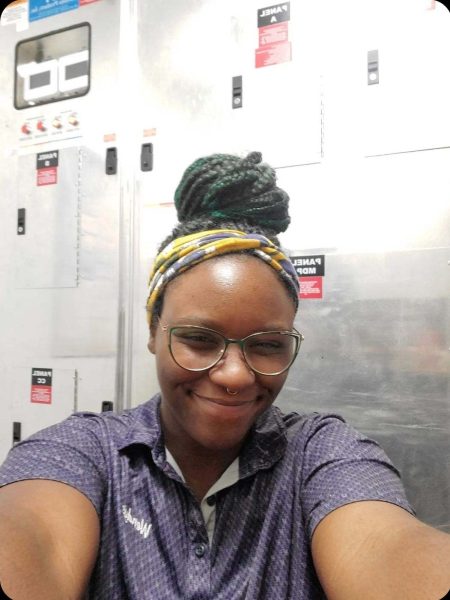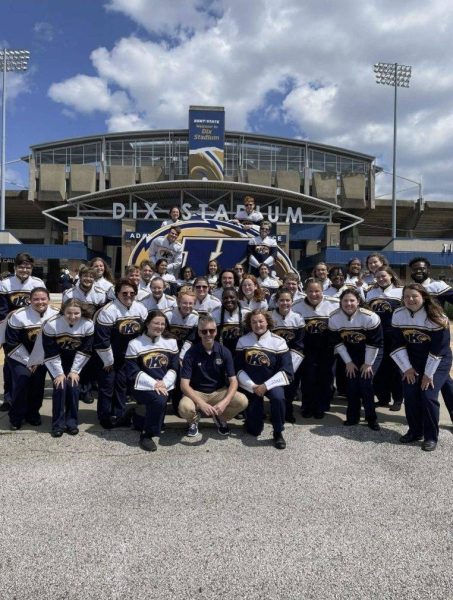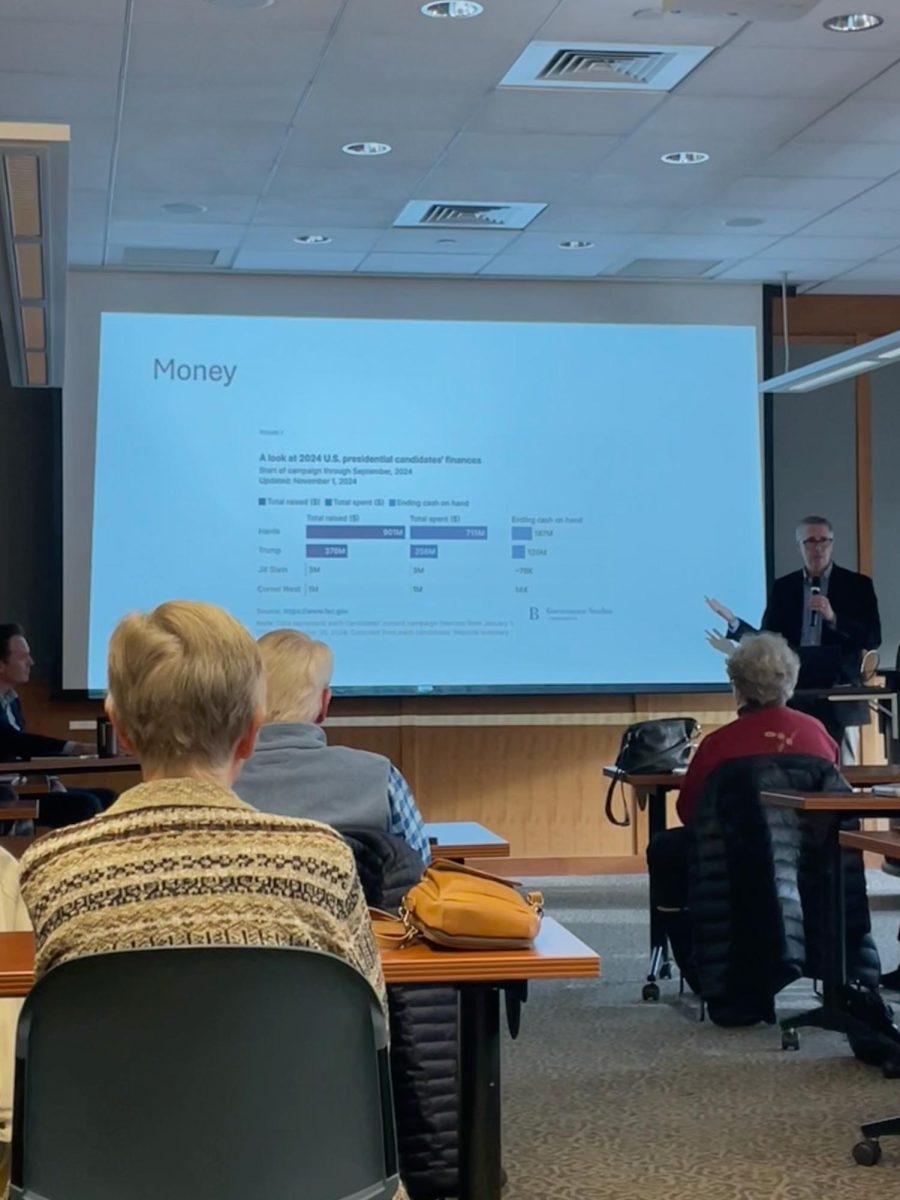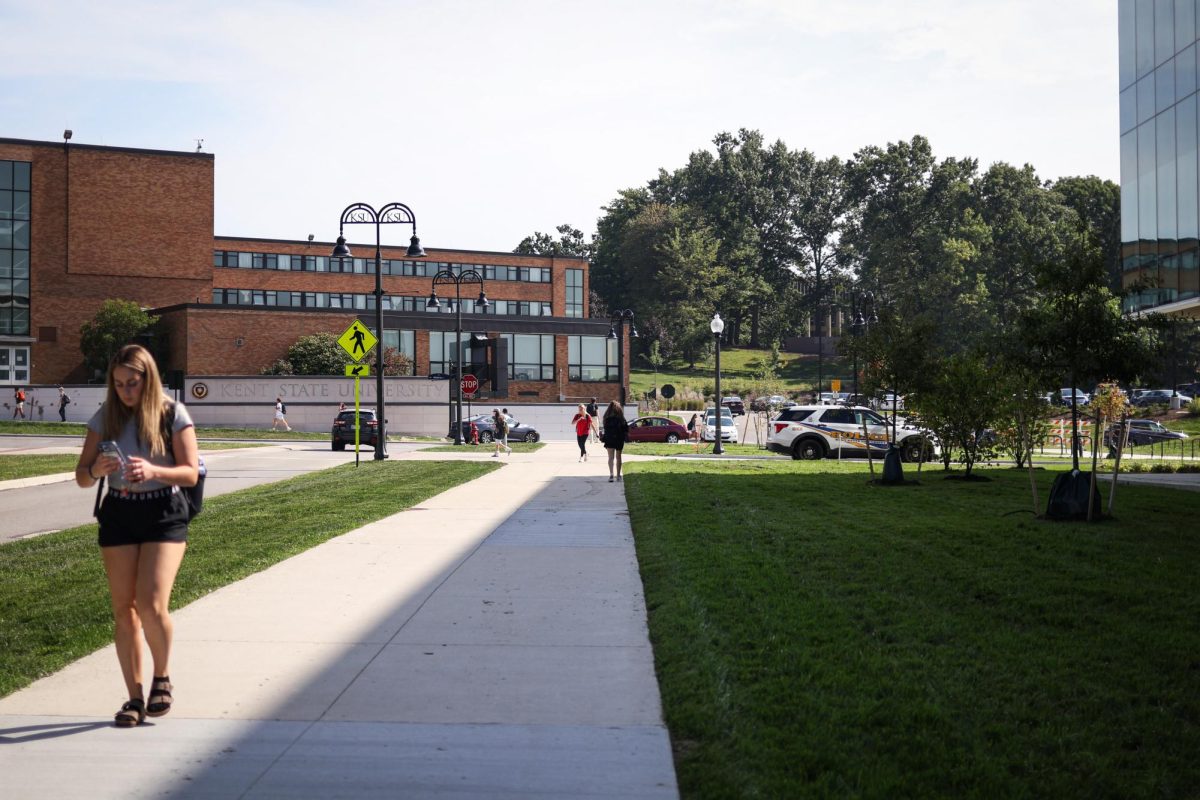Most mornings, Khayla Powell-Boyer gets dressed for class in her car – or in a Wendy’s bathroom. After completing her 5 a.m. shift as a shift manager at Wendy’s, the full-time Kent State student heads to class.
Khayla’s afternoon routine depends on the day. Half the week, she is a section leader in the university’s marching band, an unpaid position. The other half, she works as a case manager for BF Empowerment, a licensed professional clinical counseling center in Akron. Between classes, she tries to find time to call a client or two – or eat some candy. She might attend a campus event or study with friends at the end of the day.
On Sundays, her day off, Khayla may find time to hang around her friends, who she calls her support system, or she may even go on a date with her boyfriend. Unlike many students on Kent State’s campus during the weekends, she cannot go home to the Pittsburgh area with her packed schedule.
Khayla, now in her final semester as a psychology major, has this routine nearly perfected – complete with color-coded Google Sheets of homework assignments and penciled-in time for herself and her people.
“I try to have a life,” she said. “It seems as though, with everything going on, that’s not possible, but I’ve been doing this for four years, so I’ve got a pretty good system down.”
Though muscle-memory by now, Khayla’s organizational skills do not make her time as a busy worker and a full-time student any easier.
The 21-year-old must keep this schedule to afford college tuition, rent, food and everyday expenses. Without scholarships, Khayla would pay around $20,600 in tuition and fees alone. Ohio’s minimum wage is $10.10 per hour, though Khayla earns more at her jobs.

“Handouts from parents aren’t as common as they used to be, and prices are not as low as they used to be, so a lot of us are students and workers,” she said. “There’s going to be days where you’re like, ‘I don’t know why I signed myself up for all this.’ But if you put yourself in a situation, there’s a reason that you did it, so you have to power through.”
Michael Ellis, a professor and chair of Kent State’s Department of Economics, said he has seen more students working now compared to his start at the university in 1990. This is due to an increase in expenses – and fear of debt.
When reviewing data from 1990, Ellis found attending a four-year institution of higher learning, on average, cost about 18% of the median household income in the United States at the time. That percentage increased to 31% by 2021.
In 1990, Ohio’s median household income was $47,945, according to the National Center for Education Statistics. By 2021, it was $61,938, as reported by the U.S. Census Bureau.
Ellis said Kent State’s tuition, fees and room and board cost 39% of the state’s median household income in 2021.
“Ohio has been below the national average in terms of how states support higher education,” he said. “The state spends less and gives less, so Kent State has to charge higher tuition to cover the cost. Ohio’s household incomes tend to be lower than the national average. Those two things together go a long way in explaining why [attending college] has become more burdensome.”
A Hard Day’s Night
Khayla attends classes Monday through Friday. She has marching band after class Mondays, Wednesdays and Fridays, where she leads about 38 marching band members.
In her case management position, a job often “overlooked and underpaid,” she helps provide low-income, underprivileged clients with resources in the community to “help them thrive in this world that’s kind of pushed against them.” Khayla reserves Tuesday and Thursday afternoons for this, while still striving to fit in quick phone calls with clients throughout the week. She thinks about her clients 24/7, she said, and constantly searches for resources to better their lives.
She works mornings at Wendy’s in Kent, starting at 5 a.m Mondays, Tuesdays and Fridays – then works all day Saturdays. She loves her crew, Khayla said, and she called herself “really lucky” to work with the understanding bosses she has at both of her jobs.
This schedule is nothing new for Khayla, though. In high school, she was “The girl you would hate in a Netflix original.”
She never made any grade less than an ‘A’ in kindergarten through twelfth grade. In high school, she graduated with a 4.6 GPA, earned class president, ranked in the top 10 in her class, excelled as a triple varsity athlete and participated in her school’s musical and band. She barely has time to fit in a 30-minute interview now. Imagine the limited free time she had back then.
Her first semester of college was a “wakeup call.” She originally tried to do everything, as if she’s not doing everything already. She realized she had to dial it back – by her standards, at least.
“What I’m doing now seems like a lot, but I know that if high school me was looking at it, she’d be like, ‘Wow, this is a piece of cake,’” Khayla said.

But the process of finding a balance between working, attending class and maintaining a social life was not as smooth as buttercream frosting.
Khayla had tried to do it all, even helping start a community-help-focused organization with a friend freshman year and becoming a “loose” member of Kent State’s Black United Students organization. But work and school and the minimal time she had to recharge and complete homework took up most of her day.
While she remained extremely busy, unlike some first-year student peers who found themselves looking for ways to avoid boredom, Khayla found she did not get to experience as many campus opportunities as she would have liked to.
“I missed a lot of friendship building, you could say, because I was very distant from all of my friends,” she said. “The past couple years, I found a good group of friends, but most of the ones from freshman and sophomore year, they just fell off because I didn’t have enough time getting to know them. They came into my life for a chapter, but I appreciate them, regardless.”
Now, her close-knit circle consists of friends who live next door to her and her boyfriend, along with other people in her life who she loves. They keep her grounded, she said, and she is extremely grateful for it.
Working for the Weekend
After graduating in December, Khayla plans to take “time off,” as she called it, before pursuing her doctorate in psychology at Kent State in the fall of 2025 through its six-year master’s and doctoral program.
During her “time off,” Khayla will work to earn certificates related to her field and will pursue further training to help build her resume. She wants to keep the case management job she has now at BF Empowerment, and she may stay at Wendy’s, where she could even earn a large promotion that requires longer hours and being on-call all day after she graduates.
After shadowing clinicians and learning from their individual strategies of problem solving and handling fear, Khayla hopes to one day have her own practice with her own group of clinicians, doing similar work to what she does at her current job. She wants her future business to focus on helping people of color who, like herself, may have had trouble finding a therapist who represents them.
“I know that for people that look like me, it’s a little difficult to find a therapist who looks like them,” she said. ”I could not find one for the longest time.
“That’s the other part: Therapy is so important. It really does give you somebody to vent to. Sure, your friends are there, your family’s there, but it’s nice to be able to have a professional to be like, ‘Everything that you’re saying is valid.’”
These goals, and her circle of support, keeps the almost-graduate motivated.
Khayla said she still keeps positive through it all, knowing the days of getting ready for class in a Wendy’s bathroom and running from commitment to commitment to social time will not last forever – hopefully.
“This might be a hard part, but you do it all so that life in general isn’t the hard part,” she said. “Like one day, it won’t be school, homework, class, work – work – and then trying to sneak in a bagel or something. One day it won’t be that, so that’s what keeps me going through.”
Isabella Schreck is editor-in-chief. Contact her at [email protected].







